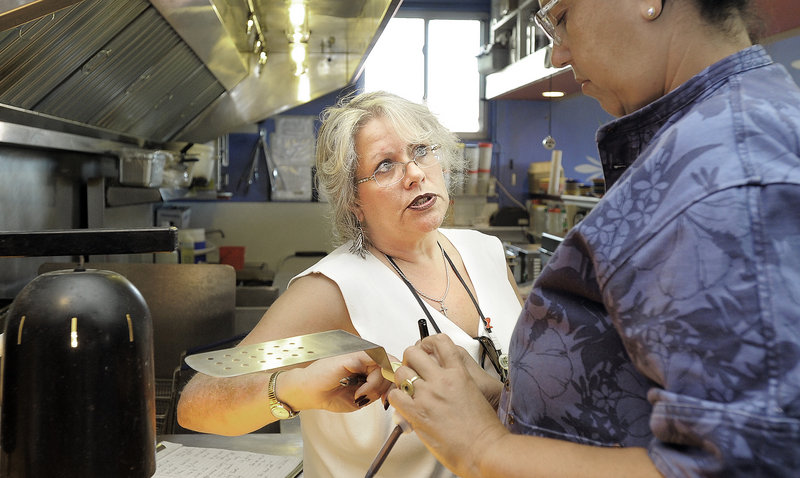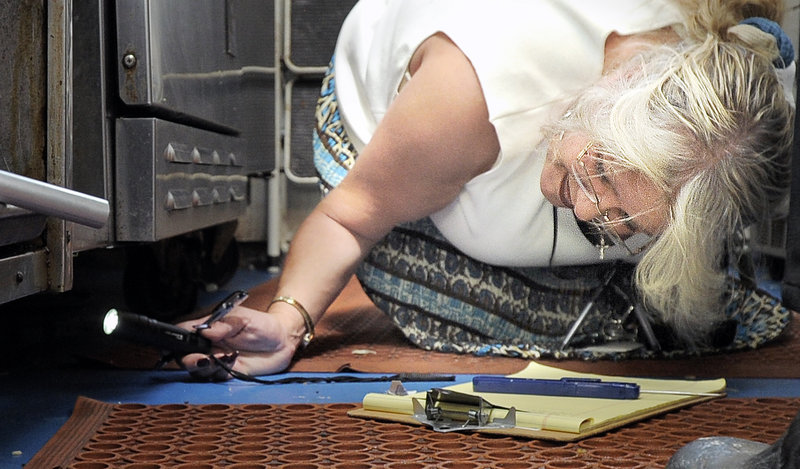PORTLAND – City officials acknowledge that they aren’t inspecting restaurants as often as they should, and that they don’t have the resources to do so.
They also are considering a system of fines for restaurants that repeatedly violate health codes.
City Manager Mark Rees said he intends to ask for funding in next year’s budget for additional restaurant inspectors and resources. Portland has one full-time inspector, who inspected only 49 of the city’s 800 eating establishments in her first year on the job. She failed 39 of them. State law requires restaurants to be inspected every two years.
Most of the 49 inspections in Portland were prompted by complaints or restaurants’ openings.
“One restaurant inspector for the entire city is not adequate,” Rees said. “Right now it’s on a complaint-driven system. I’d much rather see we’re more proactive in our inspections.”
Portland’s inspection program has been under close scrutiny since the city temporarily shut down the Porthole restaurant, the Comedy Connection nightclub and the Harbour’s Edge banquet hall, citing a “serious rat infestation.” Inspection reports, released at the request of the Portland Press Herald, revealed that the restaurant had a history of violations.
Portland is one of only four municipalities in Maine that are allowed by the state to inspect their own restaurants. The health inspection program in the state Department of Health and Human Services oversees restaurant inspections throughout Maine.
From the 1980s until last year, Portland code officers inspected restaurants. That staff, which has varied in size from three inspectors to nine, was also responsible for reviewing proposed developments, and doing building, plumbing and electrical inspections.
That system made it difficult for the city to keep up with restaurant inspections and keep readily accessible records.
Last year, the inspection program was moved to the city’s Health and Human Services Department, and Michele Sturgeon was hired as the lone inspector.
“We put it in the right place,” Rees said of the program. “We now need to make sure it’s adequately staffed and resourced to do the job correctly.”
While staffing issues must wait until next year’s budget process, the City Council’s Public Health and Safety Committee will consider updates to the city’s food code in October.
Ann Freeman, a city attorney, said she is working on a draft of the changes, largely designed to align the city’s code with the state’s. She said she has been talking with the public health division about whether to adopt the schedule of fines outlined in the state code.
The state code calls for a $50 fine for each “critical violation,” defined as one with the potential to contaminate food or cause an illness. If a critical violation is repeated from a previous inspection, the fine doubles to $100.
Non-critical violations, which can range from a wastebasket without a lid to plumbing issues, can come with penalties of $25 for first violations and $50 for repeat violations.
Restaurant owners are already assessed $75 fees for follow-up inspections made necessary by previous failures.
“Obviously, you want the positive reinforcement of going out and educating people,” Rees said. “By the same token, if you can have a tool for those people who are egregious or ignore us, I think that’s helpful as well.”
Rees said he would support fines for repeat offenders and scofflaws.
The city has been trying to educate restaurant owners by holding regular informational sessions. The five sessions held this summer drew 51 people, said Douglas Gardner, the city’s director of public health and human services.
Any system of fines would require approval from the City Council.
Mayor Michael Brennan said Monday that he hasn’t talked with the city’s staff about issues surrounding the restaurant inspection program. He would not say whether he thinks the city should consider adopting fines.
“I don’t have any opinions at this particular time,” Brennan said.
Councilor Edward Suslovic, who chairs the public safety committee, said he is open to fines, which he said would be designed to bring businesses into compliance rather than make money for the city.
Suslovic also suggested that publicly listing restaurants’ inspection status on the city’s website may be more effective than fines.
“Public reputation is the most effective means in a highly competitive food service business,” he said. “But there are some folks that, the only way they’ll listen to it and take action, is to hit them in the pocketbook.”
Staff Writer Randy Billings can be contacted at 791-6346 or at:
rbillings@mainetoday.com
Twitter: @randybillings
Send questions/comments to the editors.





Success. Please wait for the page to reload. If the page does not reload within 5 seconds, please refresh the page.
Enter your email and password to access comments.
Hi, to comment on stories you must . This profile is in addition to your subscription and website login.
Already have a commenting profile? .
Invalid username/password.
Please check your email to confirm and complete your registration.
Only subscribers are eligible to post comments. Please subscribe or login first for digital access. Here’s why.
Use the form below to reset your password. When you've submitted your account email, we will send an email with a reset code.